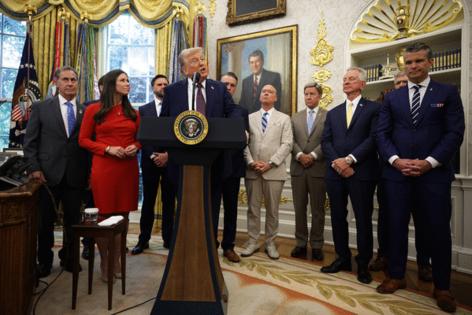Trump asks Supreme Court to quickly decide tariffs challenge
Published in Political News
WASHINGTON — The Trump administration asked the Supreme Court to quickly decide the legality of President Donald Trump’s broad tariff regime and overturn a lower court ruling that found he exceeded his authority.
The Justice Department in a filing late Wednesday urged the justices to overturn a 7-4 ruling from the U.S. Court of Appeals for the Federal Circuit that Trump’s so-called “Liberation Day” and many other tariffs he instituted violated federal law.
The court found that the Constitution gives Congress the power to set tariffs, and a 1977 law invoked by Trump did not explicitly give him the power to impose the tariffs at issue, only to “regulate” imports.
The petition to the Supreme Court from the Trump administration, and accompanying request for a speedy resolution, argued that “the stakes could not be higher” for the president’s economic policy.
“The President and his Cabinet officials have determined that the tariffs are promoting peace and unprecedented economic prosperity, and that the denial of tariff authority would expose our nation to trade retaliation without effective defenses and thrust America back to the brink of economic catastrophe,” the petition said.
The administration asked the justices for a speedy briefing schedule and arguments by the first week of November. The justices do not have to take the case, but if they did so they would likely decide the case by the end of the court’s next term at the end of June.
The DOJ petition argued that the ruling against the tariffs has tied the hands of negotiators who have sought to use the tariffs to force trade deals with countries worldwide.
Last week, the full U.S. Court of Appeals for the Federal Circuit ruled that many of Trump’s tariffs, based on the International Emergency Economic Powers Act of 1977, were not valid. That court said it would delay the effect of its ruling until October to allow for a Supreme Court appeal.
The ruling also affirmed a three-judge panel of the Court of International Trade, which found that the tariffs violated the law.
Trump invoked that law to justify some of the tariffs on Canada, China and Mexico and the tariffs of 10% or more on most countries set to take effect in July.
In Wednesday’s petition, the Trump administration argued that the 1977 law gives the president broad powers to regulate trade outside of the normal tariff procedures when the country is faced with an emergency.
The petition argued that the nation’s burgeoning trade deficits, combined with illicit shipments of fentanyl and other illegal drugs, constituted an emergency that justified the tariffs.
Upsetting the tariffs now would impact negotiations with dozens of countries and impact an estimated $4 billion in possible tariff revenue over the coming years, the petition said.
“To the President and his most senior advisers, these tariffs thus present a stark choice: With tariffs, we are a rich nation; without tariffs, we are a poor nation,” the petition said.
The case is a combined challenge from states and businesses who argued that the tariffs violated federal law and the Constitution.
The case is V.O.S. Selections et al. v. Donald Trump et al.
©2025 CQ-Roll Call, Inc., All Rights Reserved. Visit cqrollcall.com. Distributed by Tribune Content Agency, LLC.
























































Comments